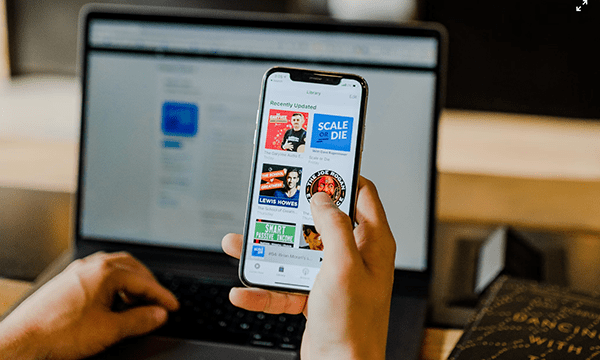
 In the days before podcasting really hit it big, feuds between musicians commonly made headlines. Notable “beefs” include Tupac vs. Biggie, Prince vs. Michael Jackson, and more recently Taylor Swift vs. Kanye West. The drama never seems to stop, and why should it? With such newsworthy headlines, these iconic disputes only seem to spark popularity and feed the machine.
In the days before podcasting really hit it big, feuds between musicians commonly made headlines. Notable “beefs” include Tupac vs. Biggie, Prince vs. Michael Jackson, and more recently Taylor Swift vs. Kanye West. The drama never seems to stop, and why should it? With such newsworthy headlines, these iconic disputes only seem to spark popularity and feed the machine.
These days, the line between podcasting and the music industry is blurred. Especially as of late, now that Spotify, the world’s largest streaming provider, with over 381 million monthly active users, including 172 million paying subscribers, stands by Joe Rogan’s podcast while Neil Young removes his music.
“I am doing this because Spotify is spreading fake information about vaccines — potentially causing death to those who believe the disinformation being spread by them,” Young wrote in a now-deleted letter, according to Rolling Stone.
More specifically, Young’s main issue is with Joe Rogan, Spotify’s star podcaster with whom they have an exclusive license to his show, a license they paid around $100 million dollars for. Rogan’s show was also the number one most listened-to podcast in 2021. Originally a comedian and TV personality, Rogan’s wildly popular and controversial podcast brings on celebrities, comedians, actors, musicians, MMA fighters, authors, artists, and beyond. Not one to shy away from controversy, Rogan has chatted with people from the alt-right and has made questionable anti-vax and anti-masking comments.
Rogan has been quoted saying that he is "not an anti-vax person,” saying "I believe they're safe and encourage many people to take them," he said while refusing to back down on claims that young people did not "need" the vaccine.
Accusing Rogan of spreading misinformation regarding the world health crisis, Young told Spotify: “They can have Rogan or Young. Not both.” A bold statement made by the Canadian-American rockstar known for his classic hits “Heart of Gold” and “Harvest Moon,” considering 60% of all his streaming music comes from Spotify listeners.
As for Young, the singer is no stranger to serious medical issues, having been a survivor of the poliovirus and catching the infection just a few years before the vaccine was available in 1955. In his memoir, Waging Heavy Peace, Young describes what it was like to get polio at just 5 years old. The disease took over his body and caused lengthy hospitalizations. He recalls how other children avoided him. Young’s symptoms continued into adulthood too.
Spotify’s market capitalization fell about $1.2 billion shortly after Young yanked his songs once the streaming giant made it clear that Rogan was chosen over Young.
All of which leads us to an interesting fork in the road. Is Spotify a music streaming company or are they committed to podcasting? What is their strategy and where do their loyalties lie? It’s pretty obvious where especially when you follow the money. Prior to Rogan going exclusive to Spotify, a host-read ad on The Joe Rogan Experience used to cost tens of thousands of dollars, whereas now, to get any ad on his show, the minimum spend is $1 million. Should Spotify go with the old rocker or the new outspoken kid on the block?
Rogan holds a secure spot in this unlikely game of thrones. After all, Spotify intentionally licensed his show to 1) convert listeners to the platform and 2) make money through ad sales. According to The Verge, when marketers buy ads on Rogan’s podcast, they are required to buy ads on the rest of Spotify’s catalog too. The catch becomes obvious – if Rogan succeeds and brings in more advertisers to the rest of Spotify’s investments then everyone on that side is happy. Spotify has other high earners like Call Her Daddy and Armchair Expert, but nothing compares to the reach, scale, and sheer popularity of The Joe Rogan Experience. Seems like a sound investment.
Perhaps podcasting’s biggest quarrel to date could have been avoided if Spotify had done a better job at communicating and going public about their guidelines.
Spotify's CEO, Daniel Ek, also released a statement, "Personally, there are plenty of individuals and views on Spotify that I disagree with strongly. We know we have a critical role to play in supporting creator expression while balancing it with the safety of our users," Ek said. "We take this seriously and will continue to partner with experts and invest heavily in our platform functionality and product capabilities for the benefit of creators and listeners alike. That doesn’t mean that we always get it right, but we are committed to learning, growing, and evolving."
Young isn’t the only one to pull the plug on Spotify. Canadian-American singer-songwriter Joni Mitchell stands in solidarity with Young and has since removed her music too. Mitchell made a statement on the website, “I’ve decided to remove all my music from Spotify. Irresponsible people are spreading lies that are costing people their lives. I stand in solidarity with Neil Young and the global scientific and medical communities on this issue.”
What do you think? Got an opinion to share here or a bigger opinion to share in a podcast? Tell us what’s on your mind. Sign up with TalkShoe to start your own podcast and share your story with the world. Start today.